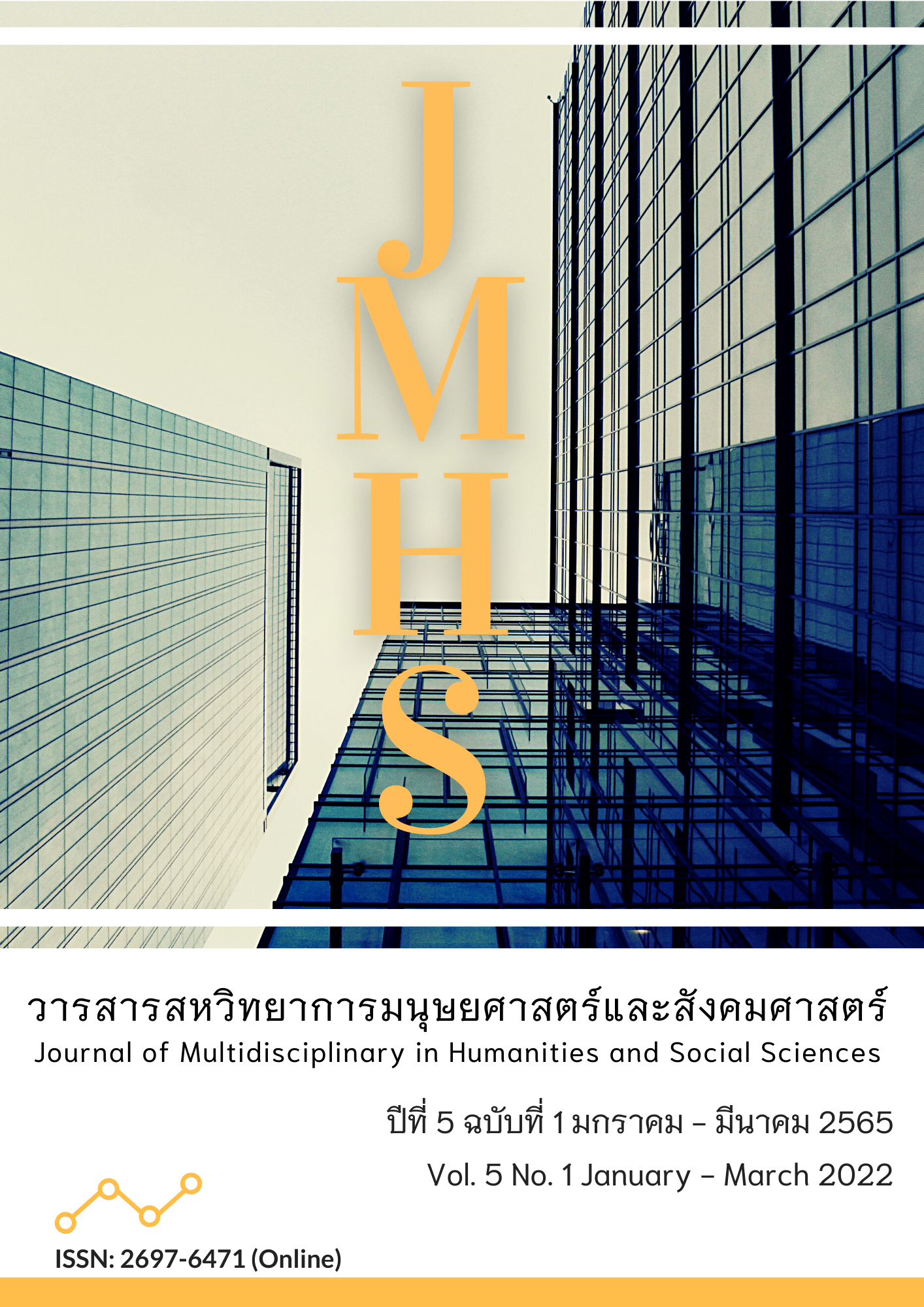The Exercising Power of Administrator School and Academic Affairs Administration under Phetchaburi Secondary Educational Service Area Office
Main Article Content
Abstract
This article aimed to study: 1) the exercising power of the administrator of a school under the Phetchaburi Secondary Educational Service Area office; 2) the academic affairs administration of a school under the Phetchaburi Secondary Educational Service Area office; and 3) the relationship between the exercising power of the administrator and the academic affairs administration of a school under the Phetchaburi Secondary Educational Service Area office. This research was descriptive research. The sample group consisted of 19 schools in the Phetchaburi Secondary Educational Service Area office: 8 people per school, for a total of 152 people. They were selected by stratified random sampling. The instrument for collecting data was a questionnaire. The exercising of administrators’ power based on the French and Raven concepts and the Academic Affairs Administration based on Preeyaporn Wongnutararot’s concept had a reliability statistic of 0.979. The statistics used in the data were frequency, percentage, arithmetic mean standard deviation, and Pearson’s product-moment correlation coefficient. The research results were found as follows:
1. The exercising power of the administrator of the school under the Phetchaburi Secondary Educational Service Area office, as a whole, was at a high-level ranking from the highest to the lowest arithmetic mean: reward power, referent power, legitimate power, expert power, and coercive power.
2. The academic affairs administration of schools under the Phetchaburi Secondary Educational Service Area office, as a whole, was at a high-level ranking from the highest to the lowest arithmetic mean in term of teaching and learning operations, teaching and learning services, measurement and evaluation, and planning related to academic.
3. The exercising power of the administrative school and academic affairs administration under the Phetchaburi Secondary Educational Service Area office overall, showed a high level of correlation. significantly at the .01 level.
Article Details

This work is licensed under a Creative Commons Attribution-NonCommercial-NoDerivatives 4.0 International License.
Views and opinions appearing in the Journal it is the responsibility of the author of the article, and does not constitute the view and responsibility of the editorial team.
References
ทิพสุคนธ์ บุญรอด และ มัทนา วังถนอมศักดิ์. (2564). ภาวะผู้นำมุ่งบริการของผู้บริหารสถานศึกษากับคุณภาพชีวิตการทำงานของครูสังกัดสำนักงานเขตพื้นที่การศึกษามัธยมศึกษา เขต 9. วารสารศิลปการจัดการ, 5(2), 486-500.
เนาวรัตน์ แย้มแสงสังข์. (2556). แนวคิดและกลยุทธ์ในการปรับระบบองค์การ. (พิมพ์ครั้งที่ 4). กรุงเทพฯ: การศึกษา.
ปรียาพร วงศ์อนุตรโรจน์. (2553). การบริหารวิชาการ. กรุงเทพฯ: ศูนย์สื่อเสริม.
พระมหากันตินันท์ เฮงสกุล. (2564). เทคโนโลยีสารสนเทศเพื่อการบริหารการศึกษา. วารสารนวัตกรรมการจัดการศึกษาและการวิจัย, 3(1), 1-10.
พระมหาอุดร อุตฺตโร, ทองดี ศรีตระการ และ พระณัฐพงษ์ ไกรเทพ. (2561). ภาวะผู้นำ : การบริหารวิชาการสู่การศึกษายุค 4.0.
วารสารปัญญาปณิธาน, 3(1), 42-53.
ไพผกา ผิวดำ. (2564). ชุมชนแห่งการเรียนรู้ทางวิชาชีพสู่ความสำเร็จของสถานศึกษา. วารสารนวัตกรรมการจัดการศึกษาและการวิจัย, 3(1), 11-18.
รุสไลลา สุแนแดวอ. (2554). การใช้อำนาจทางการบริหารของผู้บริหารในสถานศึกษาพีระยานาวินคลองหินวิทยา สังกัดสำนักงานการศึกษาเอกชนอำเภอโคกโพธิ์ จังหวัดปัตตานี(วิทยานิพนธ์ครุศาสตรมหาบัณฑิต). มหาวิทยาลัยราชภัฏยะลา.
โรงเรียนโตนดหลวงวิทยา. (2563). รายงานการประเมินตนเอง ปีการศึกษา 2562. เพชรบุรี: โรงเรียนโตนดหลวงวิทยา.
สมเกียรติ วันทะนะ. (2557). ทฤษฎีอำนาจ. กรุงเทพฯ: สมาคมรัฐศาสตร์แห่งมหาวิทยาลัย เกษตรศาสตร์.
สิริกร ทิติยวงษ์ และ สายสุดา เตียเจริญ. (2557). การบริหารแบบมีส่วนร่วมที่ส่งผลต่อการบริหารงานวิชาการของสถานศึกษา สังกัดกรุงเทพมหานคร. วารสารการบริหารการศึกษา มหาวิทยาลัยศิลปากร, 5(1), 188-198.
สุรชัย เอี่ยมสะอาด และ สำเริง อ่อนสัมพันธุ์. (2558). การใช้อำนาจของผู้บริหารสถานศึกษาหัวหินวิทยาคม. วารสารการบริหารการศึกษา มหาวิทยาลัยศิลปากร, 5(2), 109-117.
สำนักงานเขตพื้นที่การศึกษามัธยมศึกษา เขต 10. (2560). รายงานการประชุมผู้บริหารสถานศึกษาสังกัดสำนักงานเขตพื้นที่การศึกษามัธยมศึกษา เขต 10 ครั้งที่ 5/2560. เพชรบุรี: สำนักงานเขตพื้นที่การศึกษามัธยมศึกษา เขต 10.
สำนักงานเขตพื้นที่การศึกษามัธยมศึกษา เขต 10. (2561). รายงานการประชุมผู้บริหารสถานศึกษาสังกัดสำนักงานเขตพื้นที่การศึกษามัธยมศึกษา เขต 10 ครั้งที่ 1/2561. เพชรบุรี: สำนักงานเขตพื้นที่การศึกษามัธยมศึกษา เขต 10.
สำนักงานเขตพื้นที่การศึกษามัธยมศึกษา เขต 10. (2562). รายงานการติดตามประเมินผลการควบคุมภายใน ประจำปีงบประมาณ 2562. เพชรบุรี: สำนักงานเขตพื้นที่การศึกษามัธยมศึกษา เขต 10.
สำนักงานเลขาธิการสภาผู้แทนราษฎร. (2560). รัฐธรรมนูญแห่งราชอาณาจักรไทย. กรุงเทพฯ: สำนักงานเลขาธิการสภาผู้แทนราษฎร.
อังคณา มาศเมฆ และ มัทนา วังถนอมศักดิ์. (2559). การบริหารงานวิชาการกับคุณภาพผู้เรียนในสถานศึกษาเทศบาล กลุ่มการศึกษาท้องถิ่นที่ 5. วารสารการบริหารการศึกษา มหาวิทยาลัยศิลปากร, 6(2), 161-169.
อภิชัย พันธเสน และคณะ. (2558). การสังเคราะห์งานวิจัยว่าด้วยปัญหาและข้อเสนอแนะในกระบวนการจัดการศึกษาไทย : ประเด็นปัญหาคุณภาพการศึกษา (2535 - 2558). กรุงเทพฯ: สำนักงานกองทุนสนับสนุนการวิจัย.
อภินันท์ ข่าขันมะลี. (2563). ความสัมพันธ์ระหว่างการใช้อำนาจของผู้บริหารกับความสุขในการทำงานของครูในสถานศึกษา สังกัดสำนักงานเขตพื้นที่การศึกษาประถมศึกษานครราชสีมา เขต 2. วารสารมหาจุฬานาครทรรศน์, 7(6), 156-166.
Adams, P. (2008). Considering Best Practice: The Social Construction of Teacher Activity and Pupil Learning as Performance. Cambridge Journal of Education, 38(3), 375-392.
Best, J. W. (1977). Research in Education. New Jersey: Prentice-Hall.
Damnoen, P. S., Phumphongkhochasorn, P., Pornpitchanarong, S., & Nanposri, N. (2021). Development of Strategies for the Use of Innovative Information in Education for Secondary Schools under the Office of the Basic Education Commission in the Eastern Region. Turkish Journal of Physiotherapy and Rehabilitation. 32(3), 20483 – 20490.
Fry, H., Ketteridge, S., & Marshall, S. (2009). A Handbook for Teaching and Learning in Higher Education: Enhancing Academic Practice. (3rd ed.). New York: Routledge.
Miller, V. (1995). The Public Administration of American School System. New York: The Macmillan Company.
Phumphongkhochasorn, P., Damnoen, P. S., Suwannaprateep, T., & Phoomparmarn, U. (2021). National Educational Standards and the Improvement of Thai Education System with World Class. Asia Pacific Journal of Religions and Cultures, 5(1), 75-86.
Raven, B. H., & Kruglanski, A. W. (1975). Conflict and Power. New York: Academic Press.
Stogdill, R. M. (1974). Handbook of Leadership: A Survey of Theory and Research. New York: Free Press.
Tabarsa, R., Zynalabedin, F., & Gholamreza, G. (2013). The Relationship between Power Administrators and Physical Education Teachers Creativity. European Journal of Experimental Biology, 3(3), 6-10.
Zhao, Y. (2009). Comment on the common core Standards Initiative. AASA Journal of Scholarship, 6(3), 46-54.


